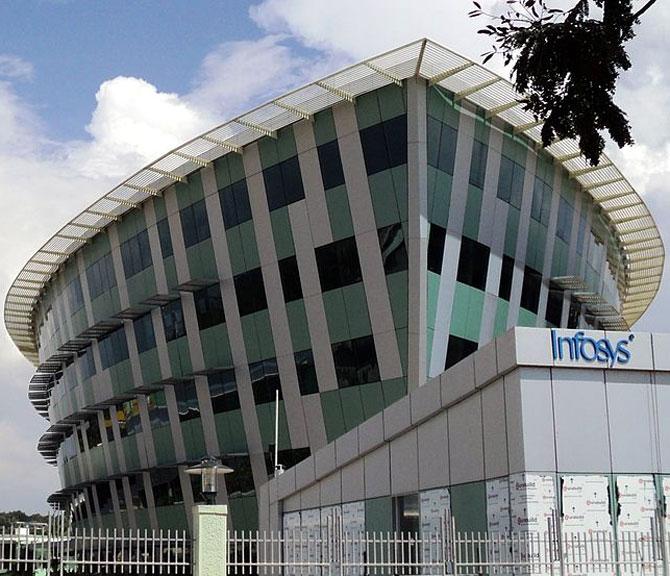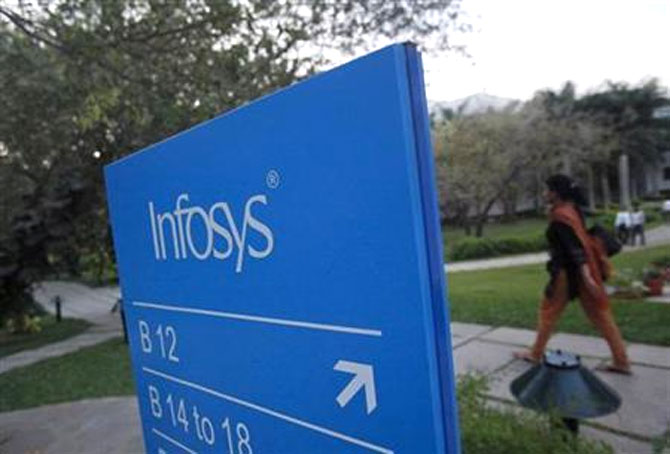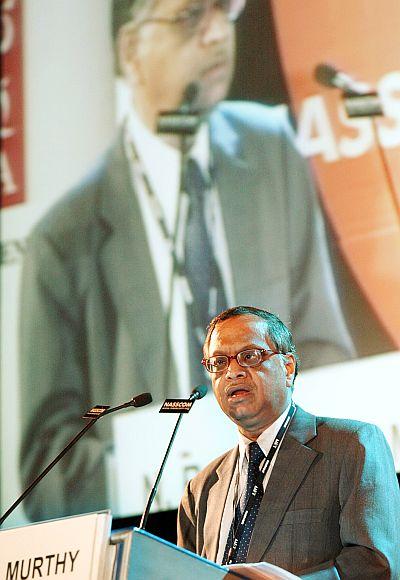 | « Back to article | Print this article |
Report puts Infosys in the dock over governance
A new report has raised serious questions on the corporate governance standards at Infosys, saying board independence at India’s second-largest information technology services firm might be the weakest among Tier-I entities.
The report, published by brokerage firm Ambit Capital Research, also says the promoters hold disproportionately high board representation with respect to their total shareholding in the Bengaluru-based company.
“While N R Narayana Murthy, S D Shibulal and S Gopalakrishnan together hold around 10 per cent in the company, they represent 23 per cent of the voting rights on the board.
"With the highest promoter representation and the lowest proportion of independent directors, Infosys’ board independence appears to be the weakest among Tier-I firms,” Ankur Rudra and Nitin Jain said in the report.
Click NEXT to read further. . .
Report puts Infosys in the dock over governance
The report, titled ‘The underbelly of Indian IT -- the ugly, the bad and not so good’ hasn’t spared a few other IT companies, either.
While it categorised the accounting and corporate governance standards at Geodesic, Educomp Solutions and Financial Technologies as ‘ugly’, these at Rolta India and MCX have been categorised as ‘bad’.
Tech Mahindra/Satyam, Infosys and KPIT Technologies have been classified as ‘not so good’.
“While some of these companies (such as FT, Educomp and Geodesic) are already understood by the market for what they are, others (such as Rolta, MCX, Infosys, Tech Mahindra and KPIT) are yet to be discounted appropriately by investors,” it said.
Click NEXT to read further. . .
Report puts Infosys in the dock over governance
When contacted, Infosys said it did not want to comment on the report.
While FT also declined comment, Tech Mahindra said the company had not seen the report and so was unable to respond.
A senior Educomp official said: “We completely reject the opinion put out in this report, that too on an accounting practice the company discontinued a little more than two years ago.
“We will go through this report and take necessary action against what seems to be an ill-researched and motivated piece to mislead investors.”
A spokesperson for Rolta India said Ambit’s was not the correct assessment.
“We have revalued all assets and, in fact, adopted a more conservative policy,” he said.
Click NEXT to read further. . .
Report puts Infosys in the dock over governance
Emails sent to other companies had not elicited any response till the time of going to press.
While talking about Infosys, the report says the company has been regarded as a paradigm of corporate governance in India ever since its initial public offering in 1993.
“While this image has earned Infosys goodwill from investors, clients and employees, there are signs these high corporate governance standards are fraying.
Murthy’s entry into Infosys in an executive capacity (even after the firm’s well-articulated policy of executives retiring at the age of 60), bringing with him his son as an executive assistant, higher promoter representation at the board and peculiar guidance pattern resulting in high volatility in share price -- none of this gels with Infosys’ image of a leader in corporate governance,” it adds.
Click NEXT to read further. . .
Report puts Infosys in the dock over governance
Infosys co-founder Murthy returned to the company as executive chairman in June last year, junking his retirement after what he claimed was a crisis call made to him by the board.
This, he said, was done to seek his help in bailing out the company, which was steadily losing its lustre.
However, he joined the company with a pre-condition to bring his Harvard-educated son, Rohan Murty, as his executive assistant.
This was accommodated by the board.
The Ambit report says the entry of Murthy, as well as his son, amounts to breach of corporate policies.
Click NEXT to read further. . .
Report puts Infosys in the dock over governance
“Infosys has historically followed a well-articulated policy of executive retirement at the age of 60, with Murthy himself being a strong proponent of the policy.
“Similarly, all the founders have time and again mentioned about not letting a family manage the business.
“More surprising was Rohan Murty’s entry into Infosys as the senior Murthy’s executive assistant.”
Infosys is known for introducing some of the global best corporate governance practices, including giving quarterly (it has discontinued the practice now) and annual revenue growth guidance, among other things.
Click NEXT to read further. . .
Report puts Infosys in the dock over governance
The Ambit report, however, says Infosys has lately been following a peculiar guidance pattern, which is leading to extreme volatility.
“There has been a pattern in Infosys’ guidance and outlook over the past three years.
“It sets a lower expectation in the fourth quarter of a year and overdelivers in the following quarters, causing extreme share price volatility,” it notes.
“Indeed, Infosys has repeated this pattern yet again by indicating on March 12 that it will settle at the lower end of the guidance for 2013-14 and giving a weaker outlook for the first half of 2014-15,” it adds.
In 2012, brokerage CLSA had written an open letter to Infosys voicing investors’ concerns.








